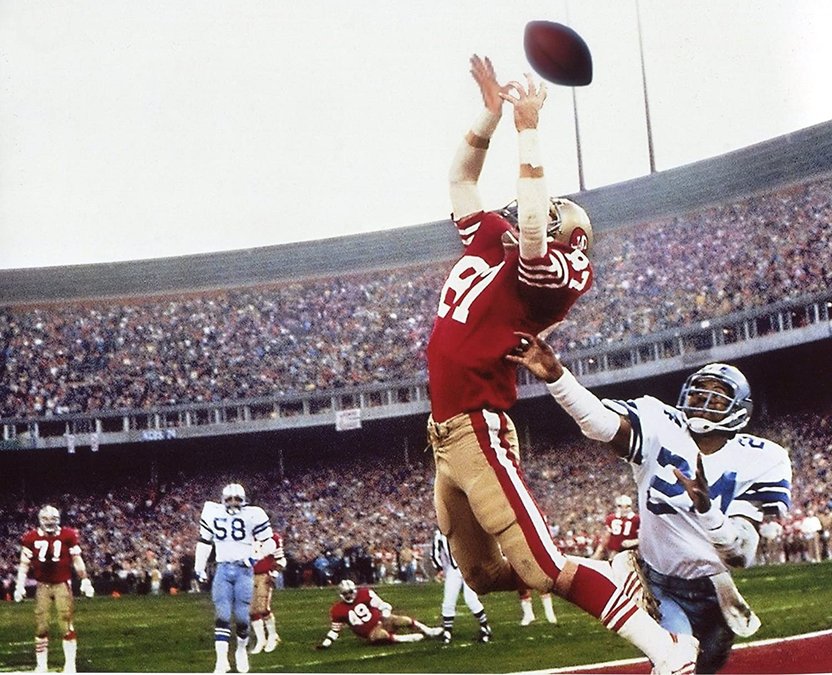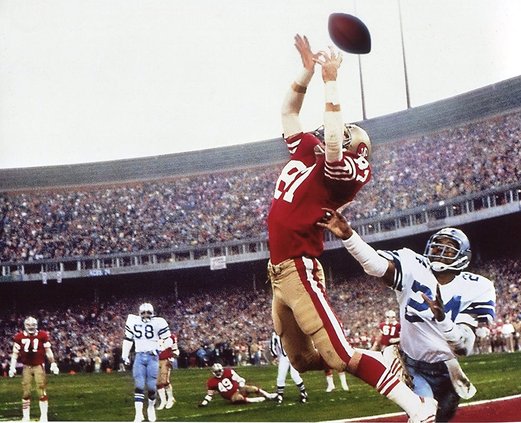“How could you!”
It was my sister calling.
“I saw The Press-Tribune.”
A little background.
It was the summer of 1982.
I was working at The Press-Tribune in Roseville. I was a reporter at the time.
I had gone to Sierra College to shoot a photo promoting the Wolverines athletic foundation.
The top prize was a football signed by the entire 1982 San Francisco 49ers Super Bowl championship team.
For 49er fans, it was worth Bubba Paris’ weight in gold. At the fundraiser dinner a few months later, it was auctioned off for $2,000.
Back to my sister’s call.
“Why didn’t you tell me?”
I asked her tell you what?
“The picture!”
Of course, “The Picture”.
It included the man who made “The Catch”.
The photo I was assigned to take was of Sierra College football head coach Rex Chappell being handed the ball by 49er head coach Bill Walsh.
As we were getting ready to take the photo, Walsh looked to his right and waved over two players who were getting ready to hit the practice field. The players? Dwight Clark and Joe Montana.
My sister, like half the people in the Roseville-Rocklin-Lincoln area, were infatuated with the 49ers.
The summer prior was the first year of the 49ers summer camp at Sierra College in Rocklin.
It was before the season that featured “The Catch” by Dwight Clark against the Dallas Cowboys.
That was followed by “The Stop” by linebacker Danny Bunz, the Oakmont High graduate from Roseville who is credited with first suggesting Sierra College as a summer facility to Walsh.
It was third-and-goal on the 1-yard line. Instead of hitting Charles Alexander of the Bengals low, Bunz hit him at the waist knocking him backwards before breaking the goal line.
That was followed by another stop on the fourth down that ended the Bengals’ comeback to seal the 49ers first Super Bowl win.
To this day when people find out I interacted with a long list of athletes over the years they admired, they had a response like my sisters’ although not quite as intense.
They thought I had the greatest job in the world.
They were right, but it wasn’t because I got a chance to interview professional athletes, a number before they became household names. That was especially true the next year when I became sports editor for three years.
Scott Pruett before he became a household name in professional racing.
Summer Sanders before she was an Olympic swimming gold medalist.
Steve Cook before he became aa 15-time Professional Bowling Association champion.
Robbie Bosco before he led BYU as quarterback to their first national championship.
Fred Besana before he quarterbacked the USFL Oakland Invaders.
All of them were from the Roseville area. They were great people first and foremost. Being accomplished athletes was just icing on the cake.
For every Summer Sanders or Robbie Bosco are tens of thousands of high school athletes who went on to become solid citizens.
Dedicated parents.
Community volunteers.
Mentors.
Leaders.
The list goes on and on.
And for the record, the same is true of others involved in bands and youth groups running the gamut from 4-H and scouting to you name it.
The common thread is belonging to something bigger than yourself.
People grow when they connect with others.
You can’t do it with a keyboard.
You can’t do it posting videos.
It has to be one-on-one.
There are some that dismiss high school sports as a waste of time.
They say that such an emphasis on high school sports and such creates false hopes.
False hopes in that it gives some kids the idea that they can make it as a professional athlete.
It is a narrative that forgets why high schools sports — and youth recreation sports as well as other things we may view as beyond the basics — came into being in the 20th century.
It had to do with molding better youth and keeping some out of trouble.
Years ago, foresighted people saw the value of having JROTC programs on Manteca Unified campuses.
It was opposed by several board members who viewed it as a none-too-subtle recruitment program for the military. While nearby districts nixed offers to form a JROTC program, Manteca Unified didn’t.
During the Great Recession when budget cuts came up, there was an outside push among parents to drop it and divert those funds into academic programs. But even many of the teachers who also were a bit cringey initially about having JROTC on campus saw its worth.
Much like football and other sports — as well as band and such — they could speak of students whose lives were changed for the better by learning the “soft skills” that being part of something bigger than one’s self.
The JROTC program, just like, sports, helped keep kids plugged into school. It also helped many to become more focused. It’s focus on homework and academics is no different than sports in requiring students to keep grades up.
JROTC — just like sports and a repertoire of other extra-curricular activities — re-enforces the need to be on time, follow through on commitments, and interact with others including strangers from different schools.
Such programs do more than teach you how to win and how to take a loss. They teach you to build on your failures to succeed.
And that goes for making noises on a trumpet that would make a dog wince to eventually seeming like you’re channeling Louis Armstrong to learning to catch a ball.
Did I mention my sister at the time of her call 40 years ago was a few years away from starting work as a high school teacher, a job she still holds today?
Today my sister is “wowed” by success stories just like she was four decades ago.
That’s also true of the young people she sees over four years who are struggling against challenges too long to list or who are adrift. Many of them are able to move forward and grow into better versions of themselves because of programs such as sports, band, and even various clubs and such or simply buying into the high school experience for want of better words.
None of the changes that most are able to make can be found in a YouTube, Instagram account, Tik-Tok or what every form of social media than happens to literally be click-y today.
It comes from real interaction with real people, face-to-face.
It is more important today than it has ever been.
And when high school students’ “Get It” the moment is much more life changing — and more impressive — than “The Catch”.
This column is the opinion of editor, Dennis Wyatt, and does not necessarily represent the opinions of The Bulletin or 209 Multimedia. He can be reached at dwyatt@mantecabulletin.com






